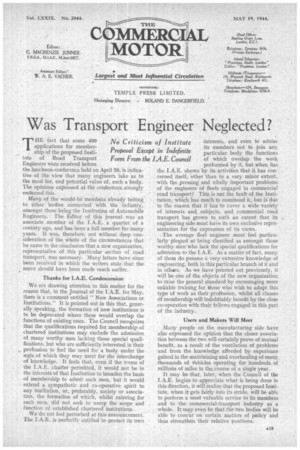Was Transport Engineer Neglected?
Page 21

If you've noticed an error in this article please click here to report it so we can fix it.
THE fact that some 400 applications for member , ship of the proposed Institute of Road Transport Engineers were received before the luncheon-conference held on April 28, is indicative of the view that many engineers take as to the need for, and potential value of, such a body. The opinions expressed at the conference, strongly endorsed this.
Many of the would-be memberi already belong to other bodies connected with the industry, amongst these being the Institution of Automobile Engineers. The Editor of this journal was an associate member of the I.A.E. a quarter of a century ago, and has been a full member for many years. It was, therefore; not without deep consideration of the whole of the circumstances that he came to the cOnclusion that a new organization, representative of this particular section of road , transport, was necessary. Many letters have since been received in which the writers state that the move should have been made much earlier. • Thanks for I.A.E. Condescension We are drawing attention to this matter. for the reason that, in the Journal of the I:A.E. for May, there is a comment entitled " New Associations or Institutions." It is pointed out in this that, generally speaking, the formation of new institutions is to be deprecated where these would overlap the functions of existing ones. The Council recognizes that the qualifications required for membership of chartered institutions may exclude the admission of many worthy men lacking those special qualifications, but who are sufficiently interested in their profession to feel theneed for a body under the xgis of which they may meet for the interchange of knowledge. It feels that even if the terms of the I.A.E. charter permitted, it would not be in the interests of that Institution to broaden the basis of membership to admit such men, but it would extend a sympathetic and co-operative spirit to any institution, or,. preferably, society or association, the formation of which, whilst catering for such men, did not seek to usurp the scope and function of established chartered institutions.
We do not feel perturbed at this announcement. The I.A.E. is perfectly entitled to protect its -own interests, and even to advise its members not to join any. particular body the functions of which overlap the work performed by it, but when has the I.A.E. shown by its activities that it has concerned itself, other than to a very minor extent, with the pressing' and vitally important problems of the engineers of fleets engaged in commercial road transport? This is not the fault of the Institution, which has much to commend it, but is due to the reason that it has to cover a wide variety of interests and, subjects, and commercial road transport has grown to such an extent that its . engineering side must have its own exclusive representation for the expression of its views.
The average fleet engineer must feel particularly pleased at being classified as amongst those worthy men'who lack the special qualifications for admission to the I.A.E. As a matter of fact, many of them dopossess a very extensive knowledge of en•gineering, both in this particular branch of it and in othws. As we have pointed out previously, it will be one of the objects of the new organization_ to raise the general standard by encouraging more sii.table training for those who wish to adopt this type of work as their profession, whilst all classes of membership will indubitably benefit by the close co-operation with their fellows engaged in this part of the industry.
Users and Makers Will Meet Many people on the manufacturing side have also expressed the opinion that the closer association between the two will certainly prove of mutual benefit, as a result of the ventilation of problems and from the knowledge afforded by experience gained in the maintaining and overhauling of many thousands of Vehicles operating for hundreds of millions of miles in the, course of a single year.
It may be that, later, when the Council of the I.A.E. begins to appreciate what is being done in this direction, it will realize that the proposed Institute, when it gets fairly into its stride, will be able to perform a most -valuable service to its members and to the commercial-transport industry as a whole. It may even be that the two bodies will be able to concur on certain matters of policy and thus strengthen their relative positions.




























































